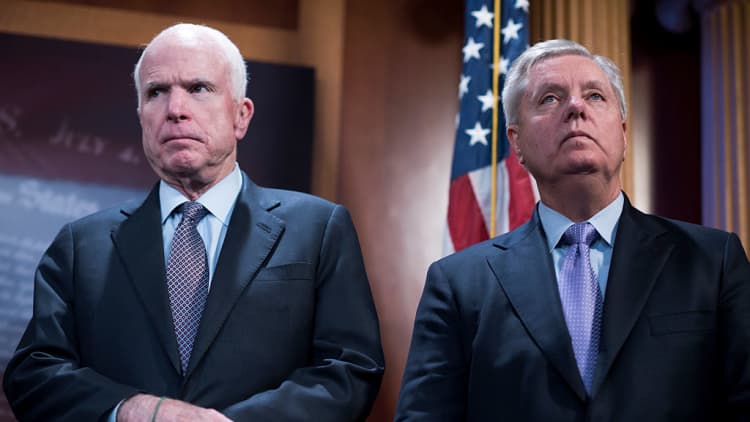
Three Republican senators on Thursday appeared to get the assurances they needed to support the GOP's "skinny" Obamacare repeal, after earlier criticizing the proposal.
In the latest twist in a bizarre legislative process, Sens. Lindsey Graham, R-S.C., Ron Johnson, R-Wisc., and Bill Cassidy, R-La., slammed the proposal to roll back parts of Obamacare at a news conference. But they later told reporters that they would back the plan after House Speaker Paul Ryan told them a House and Senate conference committee would seek a better alternative. A fourth senator who attended the news conference, John McCain, R-Ariz., would not say where he stood after speaking to Ryan.
Earlier, Graham said he could not support a "half-assed" plan that he called "politically" the "dumbest thing in history." But he added that he could back the bill if he is promised that lawmakers could strike a better Obamacare replacement deal in conference.
Johnson said the plan was sold to senators as "a vehicle to get to conference." McCain added that he is "voting no unless I see that there is a path to a conference" and said he would also listen to GOP Arizona Gov. Doug Ducey's opinions on the plan.
Essentially, the senators said they would back the plan only with the assurance that the House will not pass the same bill.
House Speaker Paul Ryan later said that his chamber is open to going to a conference committee to reach an Obamacare repeal deal with the Senate — but expressed doubts that his Republican counterparts could pass any major overhaul of the health-care system. After Ryan's initial statement, McCain responded by saying his assurances were not sufficient.
Supporting the proposal carries risks for senators who do not want it to become law. The House could simply approve it and send it to President Donald Trump's desk to end the months-long struggle to at least partially repeal Obamacare, a key GOP promise for the last seven years.
A conference committee can form when the Senate and House pass differing versions of bills and aim to strike one agreement that both chambers can then vote to approve. The House already passed an Obamacare replacement plan, the highly unpopular American Health Care Act. It is unclear if that process can produce a plan that enough Senate Republicans will support.
Separate GOP plans to immediately replace the Affordable Care Act or repeal it with a two-year transition period failed in the Senate amid Republican divisions. The skinny proposal is seen as a final attempt to push a plan through the Senate before the chamber tries to reach a plan that could also get approval in the House.
Senate Republicans unveiled the "skinny" repeal bill late Thursday just hours before they planned to vote on it. It repeals Obamacare's individual mandate, rolls back the employer mandate, suspends the medical device tax, increases contribution limits for health savings accounts, cuts off Planned Parenthood funding for one year and expands a program that would allow states to waive some consumer protections.
A Congressional Budget Office score requested by Democrats estimated that a skinny repeal plan would leave 16 million more people uninsured and make premiums about 20 percent higher than under current law. However, that report was based only on widely reported outlines of a skinny repeal proposal, meaning it does not capture the exact bill the Senate will field.
Insurance companies need to collect payments from healthier people in order to offset the costs of sicker ones. Without an individual mandate requiring Americans to have insurance or pay a penalty, it is expected that some healthy people will drop their coverage.
Graham did not mince words about the proposal.
"The skinny bill, as policy, is a disaster," he said.
It is still unclear if the Senate can reach a majority vote on the plan. As Republicans hold 52 seats, three "no" votes will block it.


